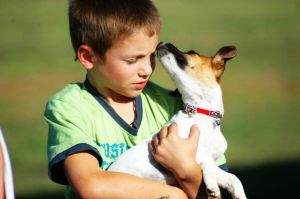Guide to Getting a Kid Friendly Dog
by Kelly Marshall
(USA)

Children and pets seem to go hand in hand, especially the family dog. However, there are several things you need to consider before bringing a new dog into a family setting that includes children. Not all dogs are a good fit with kids and you do not want to create an unhappy or even dangerous situation. Below are a few tips for getting a new dog for your family.
Age
Most of the time you do not want to bring an adult dog into a home with small children. There are simply too many variables that you cannot account for that could make the situation dangerous for your children. For example, you decide to adopt an adult dog from your local shelter, at the shelter the dog is super friendly and shows no aggressive tendencies. What you do not know however is that this animals previous owners allowed children to torment the dog on a regular basis and this friendly animal is not going to take kindly to your children. There are always exceptions to the rule, such as a case where your children are much older or you adopt the dog from someone you know quite well.
Size
Do you want a small housedog perfect for apartment living? What about a big rambunctious creature for your home in the country? Your first decision will be on what size dog you can accommodate, the bigger the dog the bigger everything else will be, including the messes! This is a matter of personal taste and current living arrangements, small dogs do well in either setting but large dogs need a little room to stretch their legs.
Breed
Some breeds just do not make good family pets, while others are perfect for children. You will need to research your breeds carefully based on the size of the dog you desire. A good example of small dogs to stay away from when you have children is the cocker spaniel. Unbelievably there are many kids bitten each year by these docile looking dogs. They are great dogs they just have a low tolerance generally for children, this will be particularly true during mating season. Big dogs you might want to avoid are the American pit bull terrier and Great Danes.
Without starting a huge debate on nature versus nurture you have to consider to potential damage one of these dogs can do, they may never bite but if they did, the results are catastrophic. You will find dogs in both these breed categories that have never harmed a child but the question is should you risk it? If this is your first dog, your children are young and you have little experience noticing warning signs stick with safer breeds like the Labrador or German Sheppard. Of course, you also have the option of choosing the middle ground of dogs like the Brittany spaniel, a medium sized animal.
Conclusion
Whatever dog breed you finally settle on you need to remember one thing, there are no truly bad dogs, only bad owners. It is important that you take the time to train both your children and dogs on how to interact with one another. Keep these tips in mind and you will never go wrong when choosing a dog that will fit in with your growing family.







